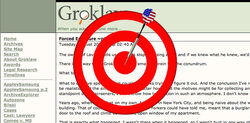Trying to Make Material of Groklaw Easily Accessible Again
TWO weeks ago we wrote about Groklaw having gone offline for an extended period of time (it already happened some years ago, but eventually the site came back online; issues began around 2020). We've since then checked access to the site again and again almost every day; still offline.
Having also just noted that "sites critical of [GAFAM] perish there remain fewer "last copies" of things or fewer critics online" we thought we'd mention existential risk to Groklaw's "insurance files" in the Wayback Machine and in the Internet Archive (not the same thing! Wayback Machine is informal and automated, not user-uploaded like most of Groklaw).
The reality isn't pretty and it's no longer possible to make copies of pages from Groklaw, except through the Wayback Machine and Internet Archive, maybe LoC (US Library of Congress). The Wayback Machine and Internet Archive may go offline in the coming years! That would devastate so many things, including researchers, Wikipedia, and historians.
A reader said today: "The passing of Groklaw could use a retrospective of why it was founded by PJ, what her goals are, what she did achieve, and why she had to stop, and what treasures were there in regards to third party documents, court records, original articles, and well curated, thoughtful discussions. The discussions were more or less culled when the site went read only back in ~2013." (Years later it became a static archive, not GeekLog anymore; it was also incomplete)
The site's initial "throw-in-the-towel" moment was in 2011. It came back only temporarily. In 2013, right after Edward Snowden's NSA leaks, PJ called it quits for good. She updated News Picks a year later because of Alice (SCOTUS outcome), but that was it.
"Each of those is worth 5 to 10 screens of material I would guess," the reader said.
Over the next few days we'll try to make more easy to find/access old material from Groklaw, seeing that the site might never come back anymore.
In a lot of ways, we're entering the Dark Ages again, not just due to wars and climate changes (inflated by intertwined factors: overpopulation, industrial revolution, pollution et cetera). █


